(完整版)中考英语语法思维导图13动词
(完整版)中考英语语法思维导图(13)动词
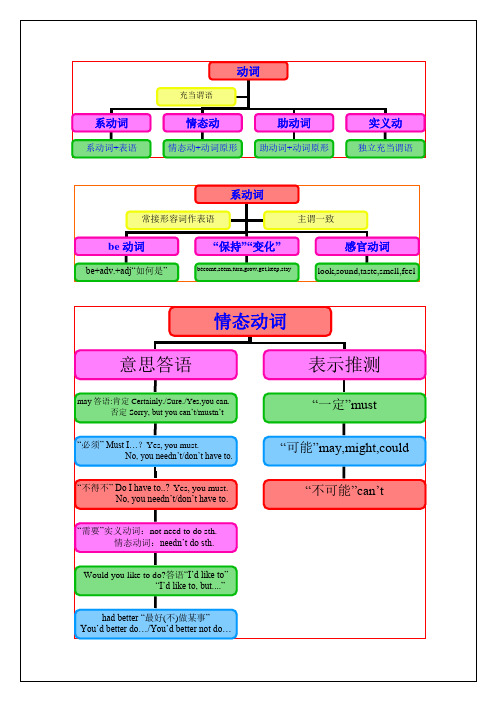
表示推测
“一定”must “可能”may,might,could
“不可能”can’t
句型操作及答语
助动词
实义动词身份
狭义概念:“赠送的”
扩展概念:“自带的”
do,does,did
凡谓语由两部分构成之前者
助动词身份/强调功能
实义动词
及物动词必须跟宾语
不及物动词不直跟宾语
时态意思需要时Fra bibliotek,标志名称
谓动
now, these days
at this time yesterday, at that time tomorrow,this afternoon,next year
the next day so far,in the past years,since by yesterday/then/the end of
后接 to do 的动词:like, ask, wish, hope, dare, offer, decide, help, long, learn, start, begin, agree, refuse, want, expect, promise, pretend, plan, manage, afford, prepare 被形宾代替:think/find/make+ it+adj. +(for sb./of sb.)+to do sth.
到过去已做
2
语态
被动:be+done
一般现在 时
一般过去 时
一般将来 时
含情态动 词
选项有无被动只需考 虑时态
该而不:感官发生实现 出版
使役动词正常不带 to 被动则带
动词词形变化
第十二章动词不定式(思维导图+知识梳理+好题精炼)2022-2023初中英语中考语法归纳
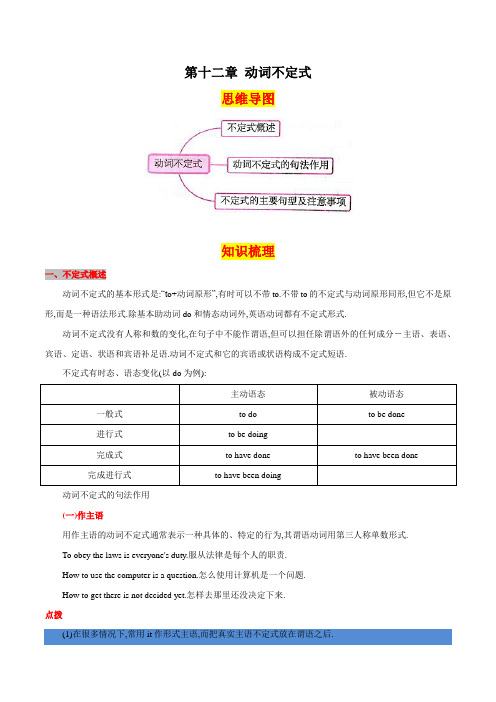
第十二章动词不定式思维导图知识梳理一、不定式概述动词不定式的基本形式是:“t o+动词原形”,有时可以不带to.不带to的不定式与动词原形同形,但它不是原形,而是一种语法形式.除基本助动词do和情态动词外,英语动词都有不定式形式.动词不定式没有人称和数的变化,在句子中不能作谓语,但可以担任除谓语外的任何成分-主语、表语、宾语、定语、状语和宾语补足语.动词不定式和它的宾语或状语构成不定式短语.不定式有时态、语态变化(以do为例):动词不定式的句法作用(一)作主语用作主语的动词不定式通常表示一种具体的、特定的行为,其谓语动词用第三人称单数形式.To obey the laws is everyone's duty.服从法律是每个人的职责.How to use the computer is a question.怎么使用计算机是一个问题.How to get there is not decided yet.怎样去那里还没决定下来.点拨(1)在很多情况下,常用it作形式主语,而把真实主语不定式放在谓语之后.It was difficult to sell my car.我的车很难卖掉.It's not known where to stay for the night.在哪里过夜还不知道.(2)如果要表示不定式的动作是谁做的,一般在不定式前加一个for短语.It will be a regret for us not to help him.我们没有帮助他是个遗憾.(3)在某些形容词(如kind, good, nice, wise, unwise, clever, silly, wrong, right, foolish, stupid, careless, considerate, rude, naughty, impolite等)作表语时,不定式前常可加一个以of引起的短语,来说明不定式指的是谁的情况.It would be rude of us to refuse their invitation.(我们)拒绝他们的邀请,会显得无礼.(二)作表语作表语,一般紧跟在系动词,如:be, seem, get等后面,用以说明主语.The question is when to start.问题是什么时候启程.You seem to have lost weight.你好像减肥了.What we have to do first is to find a solution.我们得做的第一件事是找出一个解决办法.点拨当不定式所作的表语仅用来说明主语的内容时,这个不定式只作单纯的表语,而不具有未来的含义.(三)作宾语能以不定式作宾语的动词很多,常见的有:agree, begin, decide, expect, forget, hope, learn, like, manage, pretend, start, try, want, wish等.Do you wish to see the manager?你想见经理吗?They decided to learn English hard.他们决定好好学英语.Don't forget to meet me at 6:00.别忘了六点钟和我见面.有些动词,如:tell, advise, show, teach, know, forget, learn , remember, show,understand, see, wonder, hear, find out, explain, decide, discuss等后面,常用带疑问词的不定式作宾语.We don't know who(whom)to ask.我们不知道问谁.We asked how to get to the station.我们问怎么到达车站.Have you decided where to go for your holidays?你们决定到哪儿度假了吗?I don't know whether to apply for the job or not?那份工作我不知道申请还是不申请?(四)作定语I have no time to waste.我没有时间可浪费.Let me find a place to park.我来找个停车的地方.He is always the first to come to work and the last to leave.他总是第一个来上班,最后一个走.点拨不定式修饰something, anything, nothing时,放在它们的后面.如果something, anything, nothing 有形容词来修饰,词序是something(nothing...)+形容词+不定式.My father had something to do.我父亲有事要办.Have you got anything important to buy?你有什么重要的东西要买吗?(五)作状语不定式常可用作状语,修饰动词,表示行为的目的、结果、原因等.一般放在被修饰词之后,但在表示目的时,为了强调也可放在句首.1.作目的状语为加强语气在否定式前还可加上in order或so as组成词组(即:in order to...,so as to...),作状语表示目的.To live a long and healthy life, we must learn to have a balanced diet.为了能过长寿而健康的生活,我们必须懂得吃均衡的食品.I stayed there so as to see what would happen.我留在那儿,为的是想看看会发生什么事.In order to help him, we would do everything we can.为了帮助他,我们愿意尽一切力量.2.作结果状语表结果,其逻辑主语通常亦是全句的主语.在“so...as to...”“such...as to..“enough to...”“only to...”以及“too...to...”等结构中的不定式皆表示结果.She is old enough to go to school.她已到了可以上学的年龄了.He was too drunk to drive home.他酩酊大醉,没法开车回家.3.作原因状语She trembled to think of the terrible accident.想到那可怕的车祸,她就不寒而栗.We jumped with joy to hear the news.听到这消息,我们都高兴地跳了起来.(六)宾语补足语1、有很多动词的后面都可以有不定式作宾语补足语常见的这类动词有:advise, ask, tell, help, wish, want, expect, forbid, persuade, press, request, teach, warn等.She asked her grandfather to play game with her.她请爷爷跟她一起做游戏.Mother told me to cook the meal.妈妈叫我做饭.2.有一些动词后用作宾语补足语的不定式通常不带to,这种动词有两类:一类是感觉动词,另一类是使役动词感觉动词:如feel, see, hear, watch, notice等.使役动词:如make, let, have等.Let me do it for you.让我来替你做.Don't let her go out.别让她出去.I made him work hard.我迫使他加劲干.(1)动词help之后,复合宾语中的不定式可带to,亦可不带to.在上述动词转换为被动结构时,其后的不定式必须带to.He was seen to enter the theatre.有人看见他走进了剧院.I was made to do my homework the whole night.我被迫整晚做作业.Can you help me (to) move this table?你能帮我移动一下这张桌子吗?(2)感官动词的宾语补足语有两种形式:不带to的不定式和动词-ing形式.I heard Meimei singing in her room when I went past.我路过的时候听见梅梅在房间里唱歌.(路过的瞬间正在唱,所以用singing)We often hear Meimei sing in her room.我们经常听见梅梅在房间里唱歌.(经常听见,用不定式)I saw him come in.I saw him coming in.两句话的意思都一样:我看见他进来.用不定式着重于动作的全过程,用动词-ing形式则是强调当时动作的进行情况.3.当谓语动词为think, make, find, consider, feel, regard等词,作宾语的不定式后面有宾语补足语时,常用it作形式宾语,而将真正的宾语放在补足语的后面I find it easy to learn English well.我发现要把英语学好很容易.三、不定式的主要句型及注意事项(一)不定式的否定式不定式的否定式:not+不定式,经常和ask(tell)sb. to do sth.句型连用.She asked me not to drive him to the station.她要我不要开车送他到车站.Try not to be late.争取不要迟到.Mary asked me not to give my pen to Jimmy.玛丽让我别把笔给吉米.She decided not to come here again.她决定不再到这儿来.点拨不定式的否定式和否定句的区别:I asked him not to open the door.我让他别把门打开.I didn't ask him to open the door.我没让他把门打开.(二)不定式的进行时态进行式:表示在谓语动词所表示的动作或状态发生时正在进行.It's nice to be sitting here with you.在这儿陪你坐着是非常愉快的.It is unwise for him to be talking that topic all the time.他老是谈论这件事,很不明智.(三)不定式的完成时态完成式表示在谓语动词的动作或状态发生时已经完成.She said she was sorry to have missed you.她说她没见到你很遗憾.He seemed to have visited our factory.他好像参观过我们的工厂.They appeared to have met before.他们看来以前见过面.(四)动词不定式的被动语态表示被动意义I didn't want to be told about it.我不想被告知这件事.Nothing seems to have been forgotten.似乎什么也没有被遗忘.The building is said to have been destroyed in a fire two years ago.据说这幢大楼两年前已毁于一场大火.在以某些形容词,如kind, good, silly, honest, bad, stupid, bold, clever, cruel,courteous, nice, rude, sensible, tactful, wise, wrong等作表语时,后面需用以“of+名词(或代词宾格)+不定式”结构,以说明不定式所表示的动作的执行者是谁(即of短语是不定式的逻辑主语).It's very good of you to come.谢谢你的光临.How silly of you (it is)to make such a mistake!你出了这样的差错,多傻啊!It's very kind of you to say so.多谢你这么说.在had better, had best, would rather, would rather...than, would sooner, would sooner...than, cannot but, do nothing but等结构后面的不定式要省略“to”.You had better write it in English.你最好用英文写.I would rather stay at home.我宁愿待在家里.好题精练一、用-ing形式或不定式的适当形式完成句子1.Do you enjoy_________ football?(play)2.Fred didn't have any money, so he decided_________ a job.(take)3.We're going out for dinner, Would you like_________ us?(join)4.The teacher reminded the students_________ their test paper on time.(finish)5.When I was tired, I enjoyed_________ TV.(watch)6.It was a nice day, so the old man agreed_________ for a walk.(go)7.I'm not in a hurry, I don't mind_________.(wait)答案:1.playing2.to take3.to join4.to finish5.watching6.to go7.waiting二、选择括号内所给词组完成句子,注意括号内“go+v.-ing形式”构成固定搭配的用法(go boating; go fishing; go dancing; go running; go skating; go hunting; go singing)1.She's a good dancer. She always_________ on Saturday.2.I've got a gun. I'll_________ with that strong hunter next weekend.3.“Where is Tim?”“He has. _________ He always runs in the morning.”4.We have enough fish to eat. Our father_________ every day.答案:1.goes dancing2.go hunting3.gone running4.goes fishing三、仿照示例改写下列句子示例:It is very interesting to play baseball.→ To play baseball is very interesting.1.lt was not polite to speak that way before Mr. Lee.____________________________________________________________________________________________ 2.It can be quite easy to travel by air.____________________________________________________________________________________________ 3.lt will be no problem to arrive there before noon.____________________________________________________________________________________________4.To make those strangers believe us was so difficult.____________________________________________________________________________________________ 5.To help Tom speak Chinese well is not at all easy.____________________________________________________________________________________________ 答案:1.To speak that way before Mr. Lee was not polite.2.To travel by air can be quite easy.3.To arrive there before noon will be no problem.4.It was so difficult to make those strangers believe us.5.It is not at all easy to help Tom (to) speak Chinese well.四、选择填空1. _________ the bookstore, he stopped_________ a few books.A. Passing; buyingB. Passing; to buyC. To pass; buyingD. Having passed; to buy2.Bruce,look at your dirty shoes, You'd better_________ them right now.A. washedB. washingC. washD. to wash3. _________ the room, I found the computer_________.A. Entering; stealingB. Entering; stolenC. To enter; stealD. To enter; stealing4.We've worked hard for nearly one hour. Let's stop_________ a rest now.A. haveB. to haveC. havingD. have had5.My mother always tells me not_________ to the net bars(网吧).A. goB. to goC. goesD. going6.The teacher asked us_________ English for half an hour in the morning.A. reads B reading C. to read D. read7.You will have to get up early tomorrow. Stop_________ TV, Peter.A. watchesB. watchC. to watchD. watching8.I find it hard_________ English well.A. learnB. learningC. to learnD. learns9.The teacher asked John_________ a short talk in our class meeting.A. giveB. to giveC. gaveD. giving10.The girl was too poor_________ a houseA. to buy; to live inB. to buy ;to liveC. buy; to liveD. buying; living in11.It was very late at night, but Mr. Brown still went on_________.A. works B .worked C. working D. work12.Remember_________ him about it before he goes away.A. tellB. to tellC. tellingD. to telling13.Lin Tao is strong enough_________ the big box.A. carryB. to carryC. carryingD. carries14.Her mother told her_________ in bed.A. not readB. not to readC. don't readD. to not read15.When class began, we stopped_________ to the teacher carefully.A. listeningB. listenC. listens D .to listen16.You'd better_________ the cinema by bus.A. don't goB. to goC. to go toD. go to17.What did the manager_________ you to_________ at the meeting?A. tell; sayB. ask; speakC. tell; speakD. ask; talk18.Tom was let_________ in the gate house.A. waitB. to waitC. waitingD. to have waited19.Mr.Hu has enough time_________ the job in two days.A. finishB. to finishC. finishingD. finished20.Look,the building_________ is our library.A. is repairedB. being repairedC. repairingD. to be repairing21. _________ no money, I could not buy this coat.A. HaveB. HavingC. To haveD. Have had22.The teacher has something important_________ us.A. to tellB. tellsC. tellingD. told23.Li Ming didn't know_________ next.A. to do whatB. what to doC. how to doD. what do24.I'd love_________ to your birthday party.A. comeB. cameC. to comeD. comes25.It took me two hours_________ by bus.A. to get thereB. to get to thereC. get thereD. get to there答案:1-5BCBBB 6-10CDCBA11-15CBBBD 16-20DABBB21-25 BABCA五、改正下列句子的错误1.He seems to not hear from her.____________________________________________________________________________________________ 2.I hope see you soon.____________________________________________________________________________________________ 3.I made them to give the money back.____________________________________________________________________________________________ 4.The scientist gave us some advice on how learning English.____________________________________________________________________________________________ 5.No one noticed him to leave the room.____________________________________________________________________________________________ 6.Have you given up to smoke?____________________________________________________________________________________________ 7.We found him waited at the school gate.____________________________________________________________________________________________ 8.Why not to turn off the light?____________________________________________________________________________________________ 9.She didn't want me go.____________________________________________________________________________________________ 10.I don't know to swim.____________________________________________________________________________________________ 11.China is a developed country belonging to the third world.____________________________________________________________________________________________ 12.It's getting dark. We have to find a hotel to live.____________________________________________________________________________________________ 13.He said he had an important meeting to attended.____________________________________________________________________________________________ 14.They don't allow that people smoke.____________________________________________________________________________________________ 15.It's difficult sell my car.____________________________________________________________________________________________ 答案:1.He seems not to...2.I hope to see...3.I made them give...4....how to learn...5....him leave...6....given up smoking?7...him waiting...8.Why not turn off...9.She didn't want me to go.10.I don't know how to swim.11....a developing...12....to live in13....to attend.14. ...people to smoke.15...to sell my car.。
思维导图破解初中英语语法:动词(PPT讲解)

动词知识点导图系动词1细节图:
动词知识点导图系动词2细节图:
动词知识点导图情态动词1细节图:
动词知识点导图情态动词2细节图:
动词知识点导图情态动词3细节图:
动词知识点 总导图
PART 2
利用知识点导图来解题
此部分务必观看视频讲解
Use mindmaps to solve questions
have had a good time.示对过去事情否定的推测。can‘t have done意为“不可能做...“; shouldn’t have done表示对某事的责备和批评,意为“本不该做却做了”;B、D都表示 肯定的推测,由It rained a lot during their jouney可知意义不对。
初中英语高效学习
答案2
D,句意:我想给鲍勃打个电话,应该的,你很长时间没与他联系了。will 意为“将 要”,表意愿;have to意为“不得不”(外力强迫);根据后句“很长时间没与他联系了” 可推知,应选“应该",故选D。
例题3
It rained a lot during their journey, so they A. can't B. must C. shouldn't D. might
D. mustn't
初中英语高效学习
答案1
B,句意:我们或许不能证实我们是伟大的探险家,但我们确实进行了十年来最伟大的 长征。needn‘t 意为“没必要”; shouldn’t 意为“不应该” ; mustn‘t意为“禁止”;均不合 题意,may not意为“可能不”符合题意。
例题2
一I think I'll give Bob a ring. 一You , You haven't been in touch with him for ages. A. will B. may C. have to D. should
人教版英语九年级全册单元unit 13 知识点+测试卷+思维导图

Unit 13 We are trying to save the earth.1.重点词汇:bottom, fisherman, coal, advantage, industry, law, gate, bottle, president, work, metal...2. 短语归纳:1. be full of 充满2. get in the shower 在洗淋浴3. leave sth in sp 把某物留在某地4. by the time... 到……的时候;到……之前5. be late for class 上课迟到6. go off 发出响声7. brush one’s teeth 刷牙8. give sb a lift 捎某人一程9. be about to 即将……;正要……10. stare at 盯着看11. in disbelief 疑惑地;不相信地12. take off (飞机等)起飞13. show up 赶到14. get a chance to do sth 得到一个做某事的机会15. leave for sth 动身去某地16. sell out 卖光17. lose weight 减肥18. run out of 用完3. 必背典句:1. We are trying to save the earth. 我们正在努力拯救地球。
2. The river used to be clean. 这条河过去是干净的。
3. The air is badly polluted. 空气受到严重污染。
4. No scientific studies have shown that shark fins are good for health.没有科学研究表明鱼翅对健康有益。
4.语法知识:英语句子成分分析组成句子的各个部分叫做句子成分。
它包括:主语、谓语、宾语、定语、状语、表语和宾语补足语等。
中考英语语法思维导图动词
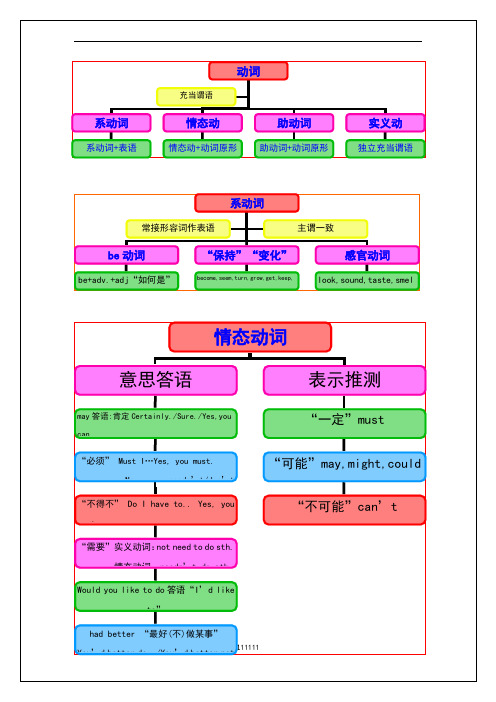
for D. was waiting for
off
34. Don’t opnut off today’s work for toofmforrow. I mean, otnoday’s work
_____ topdraayc.tised
77(7唱777)English songs for one and a half
A. give
B. gives
C. gave
D. will give
35. When I went to say goo6d6b6y6e66 to Anna, she _______ the piano.
A. is playing
B. plays
C. was playing D. played
37. Henry speaks Chinese very well. He _______ in China since 2002.
began to rain.
having
havin
g
32. Nick
a new camera. He has taken lots of pictures with it.
人教版初中英语九年级全册语法知识点思维导图

`how引导的特殊疑问句by+doing sthThe+比较级,the+比较级It's+形容词+for sb to do sth Sb find it+形容词+to do sth 固定搭配的用法finish doing sth/t 「y to do sthwhat引导的感叹旬What+ (a/an)+ad」+名词(+主话+谓语+其他)lHow+ad」/adv+主语+谔语+其他l情态动词wou ld 、could 的用法Could you please tell me how to get to the post office ?Section A How I Learned to Learn EnglishSection B How Can You Become a Successful Learner?Section A Full Moon,Full FeelingsSection B The Spirit of ChristmasSection A Fun T imePark-Always a Fun TimeUnit1 How can we become good learners7Unit2 I think thatmooncakes are delicious!Unit3 Could you please tell me where the restrooms are?Could you please tell me where the 「estau「ants a「e?used to do 的用法I used to be af 「aid of the dark. 形容词最离级的用;the+序数词+最窝级+N 第几One of the/形容词性物主代词+N s 谓语用三单N o matter+whaVwhen/where 二whatever/whenever/whereverSection B Could You please (7)Section A From Shy Girl to Pop Sta「Section B He Studies Harder Than He Used T oSection A The Dificult Search for American Products in the USb e made from和be made of 的用法和区别般现在时的被动语态am/is/are+过去分词Section B Beauty 1n Common Thingssometi m e 一段时间sometimes有时some times几次sometime某个时候等饲语辨析be used by sb. 被某人使用—股过去时的被动语态was/we飞+过去分词常用的系动词有look,feel,be,become,get,turn,smell,taste,stay(保待),keep 等词的用法Section A AnAccidental InventionSection B Do You Know When BasketballWas Invented?r section A Mom Konws BestUnit4 I used to be afraid of the darkUnit5 What are the shirts made of?Unit6 When was it invented?Unit? Teenagers should be allowed to choose their own clothesalso 、创her 、too 的用法She is a sixteen-year-old girl 二She is sixteen yea 「s oldSection B Should I Be Allowed to Make My Own Decisions? IUnit8 It must belong to Carla.Section A Read the article and decide which might be the best titlesomething,anything,nothing, everything等不定代词There must be something visiting our home must, m ay, m ight, c ou l d,may,can't S ecti o n B Stonehenge---Can Anyone Exp固n Why It Is There?The d心onary must be mineSection A What Do You Feel Like Watching Today?Unit9 I like music that I can dance toSection A Read the following opinionsUnit10 You're supposed to shake hands.Unit11 Sad moviesmake me erUnit12 Life is full of the unexpected.Unit13 We'「e tr ying to save the earth!Section A The Shirt of a Happy Man,ection B The Winnin a函m Section A Life Is Full of the UnexpectedSection B Read the passageSection A Save the Sharks!Section A I RememberUnit14 I remember meeting all of vou in Grade7Section B Readthe passageI like music that I can dance toWe are supposed to stoo smokin g .it 是形式主语或形式宾语I was supposed toarrive at7:00make sb do/make sb adjSoft and quiet music makes me relax.I 过去完成时的逻用By the time I got outside,the bus had already leftI was about to go up to my of f ice when I decided to get a cof f ee firstHe used not to stay up late.清态动词的被动语态情态动词+be +动词的过去分词a d ifferent些基本句型的I凡固和使用I remember being avolunteer.。
英语语法思维导图非谓语动词
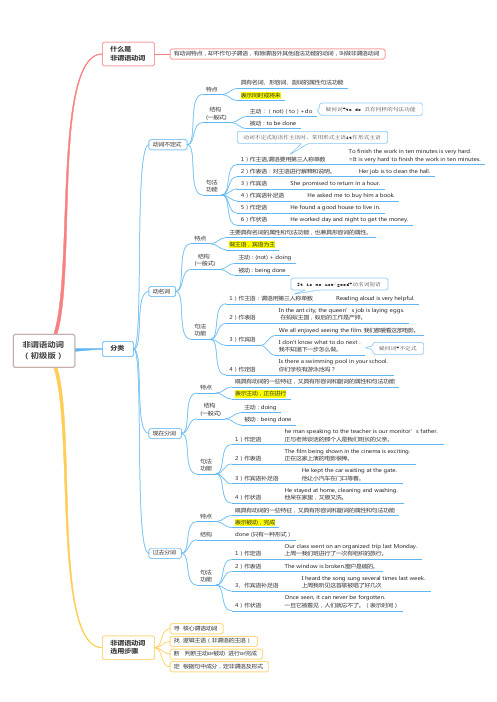
It is no use/good+动名词短语动词不定式短语作主语时,常用形式主语it作形式主语疑问词+to do 具有同样的句法功能疑问词+不定式非谓语动词(初级版)什么是非谓语动词分类特点动词不定式结构(一般式)主动:(not)(to)+do 句法功能特点动名词结构(一般式)主动:(not) + doing 句法功能特点现在分词结构(一般式)句法功能特点过去分词done (只有一种形式)结构句法功能有动词特点,却不作句子谓语,有除谓语外其他语法功能的动词,叫做非谓语动词具有名词、形容词、副词的属性句法功能表示同时或将来被动:to be done1)作主语,谓语要用第三人称单数2)作表语:对主语进行解释和说明。
3)作宾语4)作宾语补足语5)作定语6)作状语主要具有名词的属性和句法功能,也兼具形容词的属性。
被动:being done1)作主语:谓语用第三人称单数2)作表语3)作宾语4)作定语既具有动词的一些特征,又具有形容词和副词的属性和句法功能主动:doing 被动:being done 表示主动,正在进行1)作定语2)作表语3)作宾语补足语4)作状语既具有动词的一些特征,又具有形容词和副词的属性和句法功能1)作定语2)作表语3、作宾语补足语4)作状语Once seen, it can never be forgotten.一旦它被看见,人们就忘不了。
(表示时间)I heard the song sung several times last week. 上周我听见这首歌被唱了好几次The window is broken.窗户是破的。
Our class went on an organized trip last Monday.上周一我们班进行了一次有组织的旅行。
He stayed at home, cleaning and washing. 他呆在家里,又擦又洗。
He kept the car waiting at the gate. 他让小汽车在门口等着。
第十一章动词的语态(思维导图+知识梳理+好题精炼)2022-2023初中英语中考语法归纳
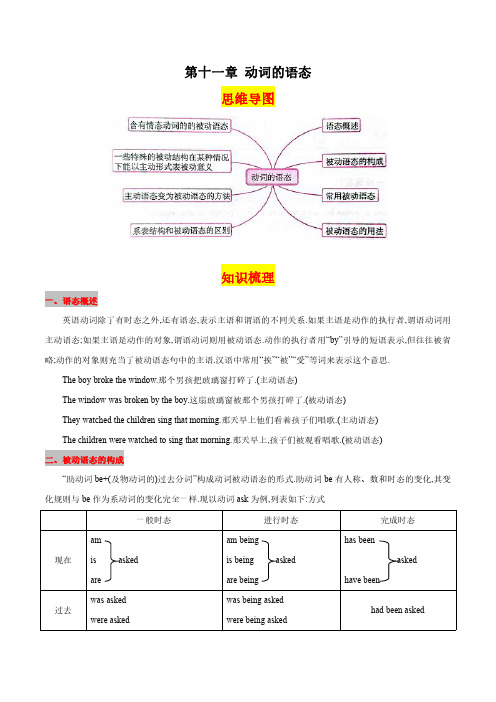
第十一章动词的语态思维导图知识梳理一、语态概述英语动词除了有时态之外,还有语态,表示主语和谓语的不同关系.如果主语是动作的执行者,谓语动词用主动语态;如果主语是动作的对象,谓语动词则用被动语态.动作的执行者用“by”引导的短语表示,但往往被省略;动作的对象则充当了被动语态句中的主语.汉语中常用“挨”“被”“受”等词来表示这个意思.The boy broke the window.那个男孩把玻璃窗打碎了.(主动语态)The window was broken by the boy.这扇玻璃窗被那个男孩打碎了.(被动语态)They watched the children sing that morning.那天早上他们看着孩子们唱歌.(主动语态)The children were watched to sing that morning.那天早上,孩子们被观看唱歌.(被动语态)二、被动语态的构成“助动词be+(及物动词的)过去分词”构成动词被动语态的形式.助动词be有人称、数和时态的变化,其变化规则与be作为系动词的变化完全一样.现以动词ask为例,列表如下:方式(一)一般现在时This kind of TV set is made in Guangzhou.这种电视是广州制造的.Chinese is spoken by the largest number of people in the world.汉语是世界上最多人讲的语言.(二)一般过去时The thief was arrested.小偷被抓住了.These pictures were taken on the Great Wall.这些照片是在长城拍摄的.(三)一般将来时Your watch will be repaired.你的表将会被修理好.The class meeting will be held next Saturday afternoon.班会下周六下午召开.(四)现在进行时A new road is being built outside my house.我们家门口正在修一条新路.The watch is being repaired.这只表正在修理.(五)过去进行时The bridge was being repaired when we passed it.我们过桥时,桥正在修.While the supper was being prepared,the light suddenly went out.正在做晚饭时,电灯突然灭了.(六)过去将来时They decided that invitations would not be sent out unless they were carefully checked.他们决定除非经过仔细校对,否则请柬不会发送出去.(七)现在完成时Your wallet has been found.你的钱夹已经找到了.Enough has been said here of this question.关于这个问题,这里已经谈得不少了.(八)过去完成时By1972a cooperative medical system had been set up in this area.到1972年这个地区已建立了合作医疗制度.When the anthem had been played,the Congress began.奏完国歌后,大会开始.四、被动语态的用法(一)不知道谁是动作的执行者,用被动语态My watch was stolen.我的手表被窃了.This jacket is made of cotton.这件夹克是棉制的.Her son was killed in World War II.她的儿子在第二次世界大战中战死.(二)没有必要或不想指出谁是动作的执行者,用被动语态The children have been very well looked after.孩子们得到很好的照顾.A big building has been put up in my home town.我家乡已经建起一座大楼.Many thousands of trees must be planted every year.每年必须种很多树.This hat was made in China.这顶帽子是中国制作的.The bicycles must not be put here.这儿不准放车.(三)强调或突出动作的承受者时,用被动语态The letter was posted.信发了.She was asked to sing a song.她被要求唱支歌.He cannot be relied on.他不可靠.A liar is looked down upon.说谎的人被人看不起.(四)出于礼貌措辞等原因不愿说出动作的执行者Anyone who sees the lion is asked to telephone the zoo and the police.有谁看见这只狮子,请给动物园和警方打电话.You are wished to do it more carefully.希望你认真一点做.(五)为使句子结构简练、紧凑,上下连贯,也即出于行文的需要When he was still a young man,he was forced to leave his home land for political reasons.他年轻时,就由于政治原因被迫离开了祖国.Lenin often talked to his comrades and was always listened to attentively.列宁经常和同志们谈话,同志们总是留心听他说.(六)在文章标题、广告、新闻等中常用省略助动词be的被动语态Telephone call placed.(TCP)电话接通了.(省略了has been)Girls Wanted.招女工.(广告用语,省略了are)Road Blocked.道路堵塞.(新闻报道,省略了is)五、含有情态动词的被动语态情态动词的被动语态,其结构是:情态动词+be+过去分词.Young trees cannot be cut down.小树不可以砍伐.The exercises must be done in class.练习必须在课堂上做.This dictionary must be taken good care of.这本词典必须保管好.The time in class must be made good use of.上课的时间必须好好地利用.六、主动形式表示被动意(一)某些由及物动词转化来的不及物动词read,write,clean,wash,iron,burn,draw,cook,keep,cut,open,blow,peel,sell,act等,常和副词well,easily, smoothly等连用,且通常用主动结构表示被动含义.The pen writes well.这支笔很好写.(二)动词need,require,want,deserve,be worth后接v.-ing的主动结构常表被动含义This film is really worth seeing.这部电影的确值得看.The car needs cleaning.这辆汽车需要清扫了.(三)有些动词如:cook,print,do等,常用主动结构的进行时表被动含义The lunch is cooking.午饭正在烧.(四)某些系动词如feel,prove,smell,taste,sound等加上形容词,也可用主动语态表示被动意义.如:The food tastes delicious.这食物味道很美.七、主动语态变为被动语态的方法把主动语态的结构变为被动语态结构时,要做如下的变动:(一)主动结构的宾语变为被动结构的主语(二)主动结构的谓语动词由主动语态变为被动语态结构的谓语动词(be+动词的过去分词)(三)主动结构的主语变为介词“by”的宾语,组成介词短语,放在被动结构中谓语动词之后.若动作的执行者无须说明或不必强调时,by组成的短语就可以省略(四)主动语态变被动语态时,时态要保持一致(五)含有直接宾语和间接宾语的主动结构,变为被动结构时,可以将其中一个宾语变为被动语态的主语,另一个不动.一般是将主动结构的间接宾语变为被动结构的主语,这样句子显得自然一些Books and newspapers in the reading room mustn't be taken away.阅览室的书和报纸都不能带走.This kind of bike is not made in our factory.这种自行车不是我们厂生产的.This picture can't have been drawn by him.这张画不可能是他画的.When was that book published?那本书是什么时候出版的?Shall we be asked to attend the opening ceremony?会邀请我们参加开幕式吗?点拨(1)带双宾语的谓语动词变为被动语态时,既可以将间接宾语转化成主语,也可以将直接宾语转化成主语.若将间接宾语转化成主语,则保留直接宾语;若将直接宾语转化成主语,则保留间接宾语,且在被保留的间接宾语前加上介词to或for.常见的能接双宾语(直接宾语和间接宾语)的词有:give,show,bring,lend,send(送,寄)等,这些词与介词to 搭配.还有buy,make,draw(画画)等,这些词与介词for搭配.We gave them some books.我们给了他们一些书.They were given some books.(变间接宾语为主语)Some books were given(to)them.(变直接宾语为主语)(2)含有宾语补足语的句子,宾语变为主语后,宾语补足语改为主语补足语,原来的位置一般不变.但如果宾语补足语是不带to的动词不定式,句子变成被动语态后则要加to,以便将两个动词隔开.We keep food cold in the fridge.=→Food is kept cold in the fridge.我们用电冰箱保鲜食品.Every day the tiger makes one of the smaller animals bring him something to eat.=→Every day one of the smaller animals was made to bring the tiger something to eat.老虎每天强迫一个小动物给他带吃的东西来.(3)短语动词的被动语态短语动词在主动结构中是一个不可分割的词组,在被动结构中也是如此,不可丢掉后面的介词或副词.The nurse takes good care of the children.阿姨很好地照顾小孩.The children are taken good care of by the nurse.孩子们受到保姆很好的照顾.八、系表结构和被动语态的区别(一)系表结构通常只用于一般现在时或一般过去时,而被动结构可用于多种时态(二)系表结构中的过去分词常常有其固定的介词搭配,被动结构则没有(三)系表结构中的过去分词可被very等副词修饰;被动结构中的过去分词可用much修饰.比较:The husband was very agitated about his wife's health.丈夫为他妻子的健康状况深感不安.(系表结构)Milk,meat,eggs and vegetables are produced in the farm.这个农场盛产牛奶、肉,鸡蛋和各种蔬菜.(被动结构)They were asked to speak at the meeting.他们被邀请在会议上讲话.(被动结构)He was puzzled about it.他为那件事感到困惑.(系表结构)九、不能使用被动语态的情况(一)某些表示状态的及物动词作谓语时常见的表示状态的及物动词有have(有),fit(适合),suit(适合),hold(容纳),cost(花费)等.The room can hold100people.这个房间能容纳100人.(二)宾语是反身代词或相互代词、表示地点或处所的名词时,不可用于被动语态在黑暗中我们几乎看不到对方.We could hardly see each other in the dark.(✓)Each other could hardly be seen in the dark.(x)(三)宾语是不定式短语或动名词时汤姆喜欢听音乐.Tom enjoys listening to music.(✓)Listening to music is enjoyed by Tom.(x)好题精练一、将下列句子变为被动语态1.Everybody respects the brave old man.____________________________________________________________________________________________ 2.We elected Comrade Li head of our workshop.____________________________________________________________________________________________ 3.She can translate the difficult sentence into English.____________________________________________________________________________________________ 4.We are turning China into a powerful industrial country.____________________________________________________________________________________________ 5.They asked her to tell a story.____________________________________________________________________________________________答案:1.The brave old man is respected by everybody.rade Li was elected head of our workshop(by us).3.The difficult sentence can be translated into English by her.4.China is being turned into a powerful industrial country(by us).5.She was asked to tell a story.二、将下列句子变成主动语态1.We were told an interesting story by our teacher yesterday afternoon.____________________________________________________________________________________________ 2.A kite is being made(by us)now.____________________________________________________________________________________________ 3.What was said by you at the meeting?____________________________________________________________________________________________ 4.Our homework must be finished first.____________________________________________________________________________________________ 5.A hole should be dug for the young tree.____________________________________________________________________________________________ 6.Will the trees be watered every day?____________________________________________________________________________________________答案:1.Our teacher told us an interesting story yesterday afternoon.2.We are making a kite now.3.What did you say at the meeting?4.We must finish our homework first.5.We should dig a hole for the young tree.6.Shall we water the trees every day?三、选择填空1.The lost boy_________this early morning.A.foundB.was foundC.is foundD.are found2.That factory_________in1970.A.builtB.was builtC.is builtD.were built3.This medicine_________before dinner.A.should have tookB.ought have takenC.should have been eatenD.should have been taken4.When the speaker entered the hall,all the listeners_________.A.had seatedB.were seatedC.seatedD.were seating5.Many trees_________in spring every year.A.plantB.plantedC.are plantedD.be planted6.The People's Republic of China_________on Oct.1,1949.A.was foundingB.was foundedC.was foundD.finded7.Our classroom_________every day.A.cleansB.be cleanedC.cleanedD.is cleaned8.A radio_________in everyday life.eB.is usedC.are usedD.was used9.Children in China_________since1949.A.are taken good careB.have taken care ofC.took good care ofD.have been taken good care of10.The patient is well_________.A.took care ofB.taken care ofC.taken careD.take care of11.The room was_________smoke.A.filled withB.filledC.fill withD.is filled with12.His new book_________next month.A.will be publishedB.is publishingC.is being publishedD.has been published13.The sun_________at night as usual.A.can be seenB.can't be seenC.can't seeD.doesn't see14.A strange sound_________last night.A.was heardB.hearsC.heardD.is heard15.The door_________.Better have it repaired.A.isn't shutB.hasn't been shutC.isn't be shutD.won't shut答案:1-5BBDBC6-10BDBDB11-15AABAD四、翻译下列句子1.应该在春天种树.____________________________________________________________________________________________ 2.我的家乡将要建造许多大楼.____________________________________________________________________________________________ 3.教室必须每天清扫.____________________________________________________________________________________________ 4.这种书是为儿童写的.____________________________________________________________________________________________ 5.来信收到.____________________________________________________________________________________________ 6.这件外衣是棉的还是羊毛的?____________________________________________________________________________________________ 7.你的收音机三天内可以修好.8.黑板上的那匹马不可能是林涛画的.____________________________________________________________________________________________答案:1.Trees should be planted in spring.2.Many buildings will be built in my home town.3.The classroom must be cleaned every day.4.Such books are written for children.5.Your letter has been received.6.Is this coat made of cotton or wool?7.Your radio can be mended within three days.8.The hore on the blackboard can't be drawn by Lin Tao.。
掌握这50张英语思维导图
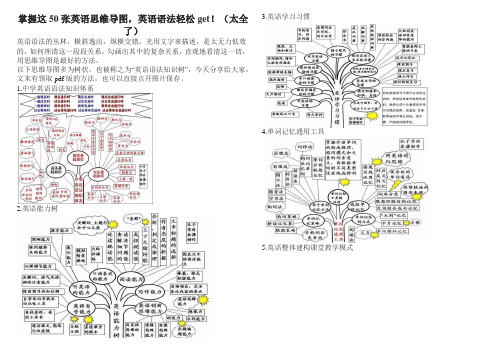
掌握这50张英语思维导图,英语语法轻松get!(太全了)英语语法的丛林,横斜逸出,纵横交错,光用文字来描述,是太无力低效的,如何理清这一段段关系,勾画出其中的复杂关系,直观地看清这一切,用思维导图是最好的方法。
以下思维导图多为树状,也被称之为“英语语法知识树”,今天分享给大家,文末有领取pdf版的方法,也可以直接点开图片保存。
1.中学英语语法知识体系2.英语能力树3.英语学习习惯4.单词记忆通用工具5.英语整体建构课堂教学模式6.“和谐教育整体建构教学法”7.中学英语16种时态8.名词I9.名词II10.冠词11.数词12.代词的分类13.人称代词14.物主代词15.反身代词16.指示代词17.疑问代词18.关系代词19.不定代词20.形容词21.副词22.形容词和副词的比较等级23.有关比较级的区别24.动词25.常见助动词用法26.助动词27.非谓语动词28.动词ing形式29.不定式的时态和语态30.省to 的动词不定式31.不定式作宾语32.不定式作补语33.不定式作主语34.不定式句法功能35.doing与to do的区别1 36.doing与to do的区别237.分词38.独立主格结构39.一般现在时40.一般将来时41.现在完成时42.一般过去时43.现在进行时44.时态与时间状语45.被动语态46.各种形式的被动语态47.句子的种类48.反意疑问句49.反意疑问句记忆规则50.反意疑问句记忆规则2。
第十三章动词-ing形式(思维导图+知识梳理+好题精炼)2022-2023初中英语中考语法归纳
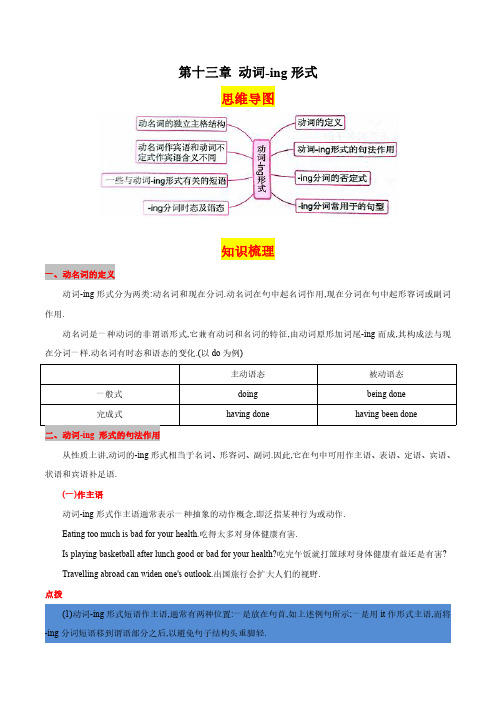
第十三章动词-ing形式思维导图知识梳理一、动名词的定义动词-ing形式分为两类:动名词和现在分词.动名词在句中起名词作用,现在分词在句中起形容词或副词作用.动名词是一种动词的非谓语形式,它兼有动词和名词的特征,由动词原形加词尾-ing而成,其构成法与现在分词一样.动名词有时态和语态的变化.(以do为例)从性质上讲,动词的-ing形式相当于名词、形容词、副词.因此,它在句中可用作主语、表语、定语、宾语、状语和宾语补足语.(一)作主语动词-ing形式作主语通常表示一种抽象的动作概念,即泛指某种行为或动作.Eating too much is bad for your health.吃得太多对身体健康有害.Is playing basketball after lunch good or bad for your health?吃完午饭就打篮球对身体健康有益还是有害?Travelling abroad can widen one's outlook.出国旅行会扩大人们的视野.点拨(1)动词-ing形式短语作主语,通常有两种位置:一是放在句首,如上述例句所示;一是用it作形式主语,而将-ing分词短语移到谓语部分之后,以避免句子结构头重脚轻.Having his brother here will make him happier.It will make him happier having his brother here.让他的兄弟待在这里将会使他高兴一些.Swimming in this river is dangerous.It is dangerous swimming in this river.在这条河中游泳很危险.(2)动词-ing形式作主语还可以用于“There is no+-ing形式”(····是不可能的)结构.There is no smoking here.这里不许吸烟.There is no joking about such matters.这件事开不得玩笑.(二)作表语动词-ing形式(短语)作表语有时起名词作用,泛指动作,有时起形容词作用,指主语的性质、状态.His hobby is collecting stamps.他的爱好是集邮.The news is exciting.这消息令人兴奋.The food smells inviting.这道菜香味怡人.My favourite sport is playing table tennis.我最喜欢的运动是乒乓球.The only thing she is interested in is dancing.她唯一感兴趣的就是跳舞.点拨不要把作表语的-ing形式与进行时态相混淆.-ing形式作表语表示主语的某种特征,而进行时态则表示正在进行的动作.试比较:Her job is teaching.她的工作是教书.(teaching是表语)She is teaching there now.她正在那儿上课.(is teaching是现在进行时态)(三)作定语动词-ing形式作定语只表明它所修饰的词的用途、所属关系等,置于被修饰词之前.a working method工作方法a dining car餐车a swimming pool游泳池building materials建材(四)作宾语在某些动词:suggest,finish,avoid,stop,can't help,mind(在乎),admit,advise,consider,deny,enjoy,require, postpone,delay,practise,fancy,excuse,pardon,miss(错过)等后面不能用不定式,而必须用动名词作为宾语.I can't help laughing.我禁不住笑了起来.Return the book to the library as soon as you finish reading it.你一看完这本书就还回图书馆.He enjoys watching TV plays.他喜欢看电视剧.点拨有些动词后既可用动名词,也可用不定式.在动词love,like,begin,start,continue等后,既可用动名词作宾语,也可用不定式作宾语,有时两种结构的意义差别不大.(五)作宾语补足语动词的-ing形式用作宾语补足语,常用在:see,hear,notice,watch,keep,find,feel,get,have等动词之后,与一个名词或代词构成复合宾语;其中宾语和宾语补足语是主谓关系.I saw him walking across the street.我看见他穿过街道.He kept me waiting for a long time.他让我等了很长时间.We watched the army marching down the street towards the park.我们观看部队沿街道朝公园行走.I heard her playing the piano.我听见她在弹钢琴.点拨在see,hear,feel,watch,notice等动词之后,既可用动词-ing形式也可用(不带to的)动词不定式作宾语补足语:如用动词-ing形式,通常表示动作正在进行;用动词不定式,则表示(或强调)动作从开始到结束的全过程.(六)作状语动词的-ing形式短语作状语时,通常都表示主语正在进行的另一动作,用来对谓语动词表示的动作加以修饰或作为陪衬,它可表示时间、原因、结果、条件、让步、方式或伴随动作,相当于相对应的状语从句.Seeing the teacher entering the room,the students stood up.=When the students saw the teacher entering the room,they stood up.学生(们)看见老师进房间,都站了起来.(两个动作同时发生)Being ill,I went home.=Because I was ill,I went home.由于生病,我回家了.The snow lasted a week,resulting in a serious traffic confusion in the whole area.=The snow lasted a week,so it resulted in a serious traffic confusion in the whole area.雪下了一个星期,造成整个地方的严重交通混乱.Be careful when crossing the street.过马路时,要小心.The students walked out of the classroom,laughing and talking.学生们有说有笑走出教室.点拨动名词也可以和about,against,at,before,after,by,besides,for,from,in,on,upon,without等介词构成短语,作状语用.Without saying good-bye,she left him.未告别,她就离开了他.After reading the passage twice,he began to do the exercises.这段文章看了两遍后,他就开始做练习了.Upon returning from Beijing,he went to visit his friend.从北京一回来,他马上就去拜访朋友.三、-ing分词的否定式-ing分词是动词的一种非限定形式,其否定式是一律在其前面加否定词“not”或“never”构成.如:I think it will do you a lot of good not going.我觉得不去对你会有好处的.I left at noon,not staying for lunch.我是中午走的,没有留下来吃午饭.I'm sorry for not having informed you of the meeting.抱歉没通知你开会.I regret not having gone together with her.我后悔没有跟她一起去.四、-ing分词常用于下列句型中It's no use...It's no good...Having difficulty/trouble...There is no...It's no use doing experiments but not considering the results.不考虑结果做实验没有用.It's no good not combining theory with practice.不把理论和实践结合就没有用.I have trouble running a long distance.我跑长跑有困难.There is no denying the fact that we are still backward.不容否认,我们仍然落后.五、动名词的独立主格结构-ing分词也可以用于独立主格结构,由“主格名词或代词+-ing分词”构成,表示时间、条件、原因、伴随情况等.The clock striking eight,they began working.时钟敲了8响,他们就开始工作了.(表示时间)The weather being fine,we went for a walk.由于天气好,我们出去散散步.(表示原因)Time permitting,we'll come to see you.如果时间允许,我们就来看你.(表示条件)也可由“with/without+宾语+-ing分词”构成独立主格结构,表示伴随情况.如:You must not sit with your feet pointing at another person.坐着时不要把脚朝着别人.六、动名词作宾语和动词不定式作宾语含义不同部分动词可加动名词作宾语,也可加动词不定式作宾语,但意思不同,如:(一)remember doing sth.表示“记得过去做过的一件事”,remember to do sth.表示“记得要去做某事”I remember seeing him once somewhere.我记得在哪里见过他一次.Remember to see him before he goes away.记住在他离开之前看他.(二)regret doing sth.表示“对过去做过的事情后悔”,regret to do sth.表示“对还没做或将要做的事情表示遗憾”I regret telling you the bad news.我后悔把这个坏消息告诉你.I regret to say I'm unable to help you.很抱歉我不能帮助你.(三)stop doing sth.表示“停止正在做的事情”,stop to do sth.表示“停止什么,然后去做另一件事情”Let's stop talking about it.咱们停止谈论这件事情吧.We stopped to see what happened.我们停下来去看发生了什么事情.(四)forget doing sth.表示“忘记曾做过某事”,forget to do sth.表示“忘记去做某事”I forgot giving the letter to her.我忘了,已经把信给她了.I forgot to post the letter.我忘记发信了.(五)try doing sth.表示“尝试着做某事”,try to do sth.表示“设法做某事”Let's try doing the work some other way.我们用别的方法做这工作试试.We must try to get everything done in time.我们必须设法及时把一切搞好.(六)mean doing sth.表示“意味着,意思是”,mean to do sth.表示“打算、想要”This means helping you.这意味着帮助你.I mean to help him with it.我打算帮助他做这件事情.七、一些与动词-ing形式有关的短语(一)表示有目的、有意识地进行练习或训练某项技能:do+(some)+v.-ingdo some reading读读书do some running跑跑步do some writing练练字This year I am going to do more speaking.今年我要多练口语.(二)表示做一些笼统、不具体指明的事:do+(some)+v.-ingdo some shopping去商店买东西(不指明买哪样具体的东西)do some washing洗东西do some cooking做饭do some cleaning扫除do some sewing缝纫(三)“go+v.-ing形式”大部分表示从事运动、消遣或娱乐活动go dancing去跳舞go swimming去游泳go skating去滑冰go skiing去滑雪go shooting去射击go boating去划船go fishing去钓鱼go hunting去打猎go riding去骑马go walking去散步go running去跑步go sailing去航海八、-ing分词时态及语态(一)-ing分词的特点:-ing分词的时态分为一般式和完成式.一般式所表示的动作与谓语动词的动作往往同时发生.完成式所表示的动作发生在谓语动词的动作之前.He insisted on finishing the work before going home.他坚持在回家前一定要先完成工作.He didn't mention having met me.他没提及已见到了我.I still remember having ever worked together with him.我还记得曾经与他一起共过事.(二)-ing分词的语态-ing分词的被动语态也有一般式和完成式两种.The large house being built near the factory is a new hospital.工厂附近正在施工的大楼是一座新的医院.Having been sent to the wrong address,the letter did not reach her.那封信投错了地址,她没有收到.好题精练选择填空1.Taking pictures_________very interesting.A.isB.areC.to beD.be2._________the bad news made him cry.A.HearB.HeardC.HearingD.Is hearing3._________a desert had always been a risk adventure.A.being crossed.Having crossed C.Crossing D.To have crossed4.Before he came,I'd finished_________the whole book.A.to readB.to have readC.readingD.read5.I always enjoy_________to popular music at night.A.to listenB.listeningC.that I can listenD.if I can listen6.We are considering_________a trip around the island.A.takeB.to takeC.to be takingD.taking7.I hope you don't mind_________at your newspaper.A.I lookB.my lookingC.I lookingD.my to look8.When a man's heart stops_________,he dies.A.to beatB.beatingC.beatD.beaten9.I can't help_________he is still alive.A.thinkingB.thinkC.to thinkD.thought of10.So far as I am concerned,I prefer readingA.than meatB.for joyC.instead of sleeping D to drinking11.It goes without_________that knowledge is important.A.talkingB.tellingC.sayingD.mentioning12.we are looking forward_________our friends next week.A.to seeB.to seeingC.to be seeingD.shall see13.He spent a lot of money_________books and magazines.A.buyB.buyingC.to buyD.bought14.The silkworm is an insect worth_________.A.to knowB.knowingC.to be knownD.being known15.She went out without_________good-bye to us.A.sayB.to sayC.sayingD.being said16.The curious student kept on_________questions.A.asksB.askingC.to askD.asked17.He is such a strange person;there's_________what he'll do next.A.no knowingB.not to knowC.not knownD.being unknown18.When she heard the bad news,she burst_________.A.into cryingB.out to tearsC.cryingD.out crying19.You must never cross the street without_________the light to turn green.A.waitingB.to waitC.waiting forD.to wait for20.Scientists succeed_________protein out of old newspapers.A.to makeB.at makingC.makingD.in making21.I became_________after watching too much television.A.boredB.boringC.boreD.bores22.I felt_________by his interest in my new invention.A.encourage B to encourage C.was encouraged D.encouraged23.He sat there_________a novel.A.readB.readingC.readsD.had read24.Don't wake up the_________child.A.sleepB.sleptC.sleepingD.sleepy25.A proverb goes:"A_________stone gathers no moss”.A.rollB.rollingC.rolledD.rolls26.The heavy rain kept us_________for two hours.A.waitB.waitedC.waitingD.to wait27.I found a dog_________over by a car on the road.A.to runB.runC.ranD.running28.We found the baby_________on the floor.A.sleptB.sleepC.asleepD.sleeping29.Jack saw a woman_________near the dog,so he walked up to her.A.stoodB.standsC.to standD.standing30.They got their ca_________at the garage.A.be washedB.washedC.being washedD.to have been washed 31_________with his report,I told him to write it all over again.A.DissatisfactoryB.Not being satisfiedC.Having not satisfiedD.Dissatisfying32._________our shoes in our hands,we crossed the stream.A.To carryB.CarryingC.CarriedD.Carry33._________my homework,I went home.A.Having finishedB.FinishedC.Being finishedD.Finish34._________the door unlocked,I went in.A.FindingB.FoundC.Had foundD.Have found35._________a careless fellow,he forget all about it.A.IsB.BeC.BeingD.Was答案:1-5ACCCB6-10DBBAD11-15CBBBC16-20BADCD 21-25ADBCB26-30CBCDB 31-35BBAAC。
英语语法思维导图总结 -词法之十大词类

词法:1. 十大词类:①实词:有词形变化;能够独立担当句子成分.v.动词;n.名词;adj.形容词;adv.副词;num.数词;pron.代词②虚词:没有词形变化;不能独立担当句子成分.prep.介词;art.冠词;conj.连词;(int.感叹词)动词:主谓关系:eg. Tom tells stories谓宾关系:eg. He gave Tom a book.词类:形容词:修饰限定关系eg. This is a good book.名词与介词:构成介词短语eg. In the book代词:代替关系冠词:用在名词前说明名词含义eg. A book名词:修饰限定eg. a evening paper 晚报2. 词与词的关系:名词:主谓;动宾关系eg. Tom tells storiesHe gave Tom a book.副词:修饰动词eg. He works very hard.动词与介词:构成动词词组eg. look after数词:主谓;动宾关系eg. Five from nine leaves four.代词:主谓;动宾关系eg. He gave her a gift 词功能:句子成分:①主语:n. ;num. ;pron.;②谓语:v. ;③宾语:n. ;num.;pron.④定语:adj. ;prep. 短语;n.;⑤状语:adv.;prep. 短语;num.⑥补语:n.;adj.;⑦表语:n.;adj. prep. 短语;个别adv. ⑧同位语:n. num.. 数:①直接加s eg. book→books;②把y变i加es ;hobby→hobbies③直接加es eg.box→boxes;④把f或fe变v加es life→lives名词:格:①直接加’s eg. a girl’s school②以s结尾加’ eg. three years’ ti me③ of 短语表达eg. the city of Beijing词法:人称代词:①主格:I;②宾格:me物主代词:①adj.性:my ;② n.性:mine反身代词:myself;ourselves;yourself;himself;herself;themselves指示代词:①时间或距离近的:/远的:this → these;/ that → those 词形变化:代词:不定代词:any ;some;each;both;many;much;few;little;other;anything ;someone;nothing;nobody;everything;none疑问代词:what;which;who;whom;whose关系代词:that;which;who;whom;whose数词:①基数词:one,two… ;②序数词:first,second..形容词和副词:①比较级加er ;②最高级加est谓语动词:①时态;②语态;③语气;动词非谓语动词:①动词不定式to do ;②过去分词:done ;③现在分词doing ;④动名词:doing①派生法:在一个单词或字根的前面或后面加上一个词缀,变成一个新词。
2023年八年级升九年级人教版暑假衔接第二讲英语语法思维导图

别懊丧,生活就像心电图,一帆风顺就证明你挂了。
课题二、英语语法思维导图第一局部中考语法思维导图词:__________________________________________________________________________ ____________________________________________句:__________________________________________________________________________ ____________________________________________其次局部词类与句子专题一词类词类英语名称例词做题考虑名词Noun (n. )pen (钢笔)English (英语)life (生活)people(人们)1.可数名词和不行数名词2.单复数3.全部格冠词Article (art. ) a / an (一、一个)the (这,那)1.the 表示特指;2.a / an 表示泛指,3.a 用在辅音音素开头的单词前,an 用在元音音素开头的单词前。
代词Pronoun(pron.)we (我们), his (他的),,this (这个)1.人称代词,物主代词,反身代词表及用法2.指示代词:this, that, these, those3.复合不定代词4.不定代词形容词Adjective(adj.)free (空闲的),happy (欢乐的),interesting (好玩的)1.用来修饰名词,表示人或事物的特征, 放名词前面2.放系动词之后3.级专题二、动词分类1.实义动词2.系动词3.助动词4.情态动词专题三、句子成分1.句子是由词依据肯定的语法结构组成的,组成句子的各个局部叫做句子成分。
2.常见的句子成分包括主语、谓语、宾语、表语、定语、补语、状语、同位语。
3.英语句子的主体成分为主语和谓语,其他为次要成分。
第十二章动词不定式(思维导图+知识梳理+好题精炼)2022-2023初中英语中考语法归纳

第十二章动词不定式思维导图知识梳理一、不定式概述动词不定式的基本形式是:“to+动词原形”,有时可以不带to.不带to的不定式与动词原形同形,但它不是原形,而是一种语法形式.除基本助动词do和情态动词外,英语动词都有不定式形式.动词不定式没有人称和数的变化,在句子中不能作谓语,但可以担任除谓语外的任何成分-主语、表语、宾语、定语、状语和宾语补足语.动词不定式和它的宾语或状语构成不定式短语.不定式有时态、语态变化(以do为例):主动语态被动语态一般式to do to be done进行式to be doing-完成式to have done to have been done 完成进行式to have been doing-动词不定式的句法作用(一)作主语用作主语的动词不定式通常表示一种具体的、特定的行为,其谓语动词用第三人称单数形式.To obey the laws is everyone's duty.服从法律是每个人的职责.How to use the computer is a question.怎么使用计算机是一个问题.How to get there is not decided yet.怎样去那里还没决定下来.点拨(1)在很多情况下,常用it作形式主语,而把真实主语不定式放在谓语之后.It was difficult to sell my car.我的车很难卖掉.It's not known where to stay for the night.在哪里过夜还不知道.(2)如果要表示不定式的动作是谁做的,一般在不定式前加一个for短语.It will be a regret for us not to help him.我们没有帮助他是个遗憾.(3)在某些形容词(如kind,good,nice,wise,unwise,clever,silly,wrong,right,foolish,stupid,careless, considerate,rude,naughty,impolite等)作表语时,不定式前常可加一个以of引起的短语,来说明不定式指的是谁的情况.It would be rude of us to refuse their invitation.(我们)拒绝他们的邀请,会显得无礼.(二)作表语作表语,一般紧跟在系动词,如:be,seem,get等后面,用以说明主语.The question is when to start.问题是什么时候启程.You seem to have lost weight.你好像减肥了.What we have to do first is to find a solution.我们得做的第一件事是找出一个解决办法.点拨当不定式所作的表语仅用来说明主语的内容时,这个不定式只作单纯的表语,而不具有未来的含义.(三)作宾语能以不定式作宾语的动词很多,常见的有:agree,begin,decide,expect,forget,hope,learn,like,manage, pretend,start,try,want,wish等.Do you wish to see the manager?你想见经理吗?They decided to learn English hard.他们决定好好学英语.Don't forget to meet me at6:00.别忘了六点钟和我见面.有些动词,如:tell,advise,show,teach,know,forget,learn,remember,show,understand,see,wonder,hear, find out,explain,decide,discuss等后面,常用带疑问词的不定式作宾语.We don't know who(whom)to ask.我们不知道问谁.We asked how to get to the station.我们问怎么到达车站.Have you decided where to go for your holidays?你们决定到哪儿度假了吗?I don't know whether to apply for the job or not?那份工作我不知道申请还是不申请?(四)作定语I have no time to waste.我没有时间可浪费.Let me find a place to park.我来找个停车的地方.He is always the first to come to work and the last to leave.他总是第一个来上班,最后一个走.点拨不定式修饰something,anything,nothing时,放在它们的后面.如果something,anything,nothing有形容词来修饰,词序是something(nothing...)+形容词+不定式.My father had something to do.我父亲有事要办.Have you got anything important to buy?你有什么重要的东西要买吗?(五)作状语不定式常可用作状语,修饰动词,表示行为的目的、结果、原因等.一般放在被修饰词之后,但在表示目的时,为了强调也可放在句首.1.作目的状语为加强语气在否定式前还可加上in order或so as组成词组(即:in order to...,so as to...),作状语表示目的.To live a long and healthy life,we must learn to have a balanced diet.为了能过长寿而健康的生活,我们必须懂得吃均衡的食品.I stayed there so as to see what would happen.我留在那儿,为的是想看看会发生什么事.In order to help him,we would do everything we can.为了帮助他,我们愿意尽一切力量.2.作结果状语表结果,其逻辑主语通常亦是全句的主语.在“so...as to...”“such...as to..“enough to...”“only to...”以及“too...to...”等结构中的不定式皆表示结果.She is old enough to go to school.她已到了可以上学的年龄了.He was too drunk to drive home.他酩酊大醉,没法开车回家.3.作原因状语She trembled to think of the terrible accident.想到那可怕的车祸,她就不寒而栗.We jumped with joy to hear the news.听到这消息,我们都高兴地跳了起来.(六)宾语补足语1、有很多动词的后面都可以有不定式作宾语补足语常见的这类动词有:advise,ask,tell,help,wish,want, expect,forbid,persuade,press,request,teach,warn等.She asked her grandfather to play game with her.她请爷爷跟她一起做游戏.Mother told me to cook the meal.妈妈叫我做饭.2.有一些动词后用作宾语补足语的不定式通常不带to,这种动词有两类:一类是感觉动词,另一类是使役动词感觉动词:如feel,see,hear,watch,notice等.使役动词:如make,let,have等.Let me do it for you.让我来替你做.Don't let her go out.别让她出去.I made him work hard.我迫使他加劲干.(1)动词help之后,复合宾语中的不定式可带to,亦可不带to.在上述动词转换为被动结构时,其后的不定式必须带to.He was seen to enter the theatre.有人看见他走进了剧院.I was made to do my homework the whole night.我被迫整晚做作业.Can you help me(to)move this table?你能帮我移动一下这张桌子吗?(2)感官动词的宾语补足语有两种形式:不带to的不定式和动词-ing形式.I heard Meimei singing in her room when I went past.我路过的时候听见梅梅在房间里唱歌.(路过的瞬间正在唱,所以用singing)We often hear Meimei sing in her room.我们经常听见梅梅在房间里唱歌.(经常听见,用不定式)I saw him come in.I saw him coming in.两句话的意思都一样:我看见他进来.用不定式着重于动作的全过程,用动词-ing形式则是强调当时动作的进行情况.3.当谓语动词为think,make,find,consider,feel,regard等词,作宾语的不定式后面有宾语补足语时,常用it作形式宾语,而将真正的宾语放在补足语的后面I find it easy to learn English well.我发现要把英语学好很容易.三、不定式的主要句型及注意事项(一)不定式的否定式不定式的否定式:not+不定式,经常和ask(tell)sb.to do sth.句型连用.She asked me not to drive him to the station.她要我不要开车送他到车站.Try not to be late.争取不要迟到.Mary asked me not to give my pen to Jimmy.玛丽让我别把笔给吉米.She decided not to come here again.她决定不再到这儿来.点拨不定式的否定式和否定句的区别:I asked him not to open the door.我让他别把门打开.I didn't ask him to open the door.我没让他把门打开.(二)不定式的进行时态进行式:表示在谓语动词所表示的动作或状态发生时正在进行.It's nice to be sitting here with you.在这儿陪你坐着是非常愉快的.It is unwise for him to be talking that topic all the time.他老是谈论这件事,很不明智.(三)不定式的完成时态完成式表示在谓语动词的动作或状态发生时已经完成.She said she was sorry to have missed you.她说她没见到你很遗憾.He seemed to have visited our factory.他好像参观过我们的工厂.They appeared to have met before.他们看来以前见过面.(四)动词不定式的被动语态表示被动意义I didn't want to be told about it.我不想被告知这件事.Nothing seems to have been forgotten.似乎什么也没有被遗忘.The building is said to have been destroyed in a fire two years ago.据说这幢大楼两年前已毁于一场大火.在以某些形容词,如kind,good,silly,honest,bad,stupid,bold,clever,cruel,courteous,nice,rude,sensible, tactful,wise,wrong等作表语时,后面需用以“of+名词(或代词宾格)+不定式”结构,以说明不定式所表示的动作的执行者是谁(即of短语是不定式的逻辑主语).It's very good of you to come.谢谢你的光临.How silly of you(it is)to make such a mistake!你出了这样的差错,多傻啊!It's very kind of you to say so.多谢你这么说.在had better,had best,would rather,would rather...than,would sooner,would sooner...than,cannot but,do nothing but等结构后面的不定式要省略“to”.You had better write it in English.你最好用英文写.I would rather stay at home.我宁愿待在家里.好题精练一、用-ing形式或不定式的适当形式完成句子1.Do you enjoy_________football?(play)2.Fred didn't have any money,so he decided_________a job.(take)3.We're going out for dinner,Would you like_________us?(join)4.The teacher reminded the students_________their test paper on time.(finish)5.When I was tired,I enjoyed_________TV.(watch)6.It was a nice day,so the old man agreed_________for a walk.(go)7.I'm not in a hurry,I don't mind_________.(wait)答案:1.playing2.to take3.to join4.to finish5.watching6.to go7.waiting二、选择括号内所给词组完成句子,注意括号内“go+v.-ing形式”构成固定搭配的用法(go boating;go fishing;go dancing;go running;go skating;go hunting;go singing)1.She's a good dancer.She always_________on Saturday.2.I've got a gun.I'll_________with that strong hunter next weekend.3.“Where is Tim?”“He has._________He always runs in the morning.”4.We have enough fish to eat.Our father_________every day.答案:1.goes dancing2.go hunting3.gone running4.goes fishing三、仿照示例改写下列句子示例:It is very interesting to play baseball.→To play baseball is very interesting.1.lt was not polite to speak that way before Mr.Lee.____________________________________________________________________________________________ 2.It can be quite easy to travel by air.____________________________________________________________________________________________ 3.lt will be no problem to arrive there before noon.____________________________________________________________________________________________4.To make those strangers believe us was so difficult.____________________________________________________________________________________________ 5.To help Tom speak Chinese well is not at all easy.____________________________________________________________________________________________答案:1.To speak that way before Mr.Lee was not polite.2.To travel by air can be quite easy.3.To arrive there before noon will be no problem.4.It was so difficult to make those strangers believe us.5.It is not at all easy to help Tom(to)speak Chinese well.四、选择填空1._________the bookstore,he stopped_________a few books.A.Passing;buyingB.Passing;to buyC.To pass;buyingD.Having passed;to buy2.Bruce,look at your dirty shoes,You'd better_________them right now.A.washedB.washingC.washD.to wash3._________the room,I found the computer_________.A.Entering;stealingB.Entering;stolenC.To enter;stealD.To enter;stealing4.We've worked hard for nearly one hour.Let's stop_________a rest now.A.haveB.to haveC.havingD.have had5.My mother always tells me not_________to the net bars(网吧).A.goB.to goC.goesD.going6.The teacher asked us_________English for half an hour in the morning.A.reads B reading C.to read D.read7.You will have to get up early tomorrow.Stop_________TV,Peter.A.watchesB.watchC.to watchD.watching8.I find it hard_________English well.A.learnB.learningC.to learnD.learns9.The teacher asked John_________a short talk in our class meeting.A.giveB.to giveC.gaveD.giving10.The girl was too poor_________a houseA.to buy;to live inB.to buy;to liveC.buy;to liveD.buying;living in11.It was very late at night,but Mr.Brown still went on_________.A.worksB.workedC.workingD.work12.Remember_________him about it before he goes away.A.tellB.to tellC.tellingD.to telling13.Lin Tao is strong enough_________the big box.A.carryB.to carryC.carryingD.carries14.Her mother told her_________in bed.A.not readB.not to readC.don't readD.to not read15.When class began,we stopped_________to the teacher carefully.A.listeningB.listenC.listensD.to listen16.You'd better_________the cinema by bus.A.don't goB.to goC.to go toD.go to17.What did the manager_________you to_________at the meeting?A.tell;sayB.ask;speakC.tell;speakD.ask;talk18.Tom was let_________in the gate house.A.waitB.to waitC.waitingD.to have waited19.Mr.Hu has enough time_________the job in two days.A.finishB.to finishC.finishingD.finished20.Look,the building_________is our library.A.is repairedB.being repairedC.repairingD.to be repairing21._________no money,I could not buy this coat.A.HaveB.HavingC.To haveD.Have had22.The teacher has something important_________us.A.to tellB.tellsC.tellingD.told23.Li Ming didn't know_________next.A.to do whatB.what to doC.how to doD.what do24.I'd love_________to your birthday party.eB.cameC.to comees25.It took me two hours_________by bus.A.to get thereB.to get to thereC.get thereD.get to there答案:1-5BCBBB6-10CDCBA11-15CBBBD16-20DABBB21-25BABCA五、改正下列句子的错误1.He seems to not hear from her.____________________________________________________________________________________________ 2.I hope see you soon.____________________________________________________________________________________________ 3.I made them to give the money back.____________________________________________________________________________________________ 4.The scientist gave us some advice on how learning English.____________________________________________________________________________________________ 5.No one noticed him to leave the room.____________________________________________________________________________________________ 6.Have you given up to smoke?____________________________________________________________________________________________ 7.We found him waited at the school gate.____________________________________________________________________________________________ 8.Why not to turn off the light?____________________________________________________________________________________________ 9.She didn't want me go.____________________________________________________________________________________________ 10.I don't know to swim.____________________________________________________________________________________________ 11.China is a developed country belonging to the third world.____________________________________________________________________________________________ 12.It's getting dark.We have to find a hotel to live.____________________________________________________________________________________________ 13.He said he had an important meeting to attended.____________________________________________________________________________________________ 14.They don't allow that people smoke.____________________________________________________________________________________________ 15.It's difficult sell my car.____________________________________________________________________________________________答案:1.He seems not to...2.I hope to see...3.I made them give...4....how to learn...5....him leave...6....given up smoking?7...him waiting...8.Why not turn off...9.She didn't want me to go.10.I don't know how to swim.11....a developing...12....to live in13....to attend.14....people to smoke.15...to sell my car.。
初中英语语法归纳动词概说(思维导图+知识梳理+好题精炼)
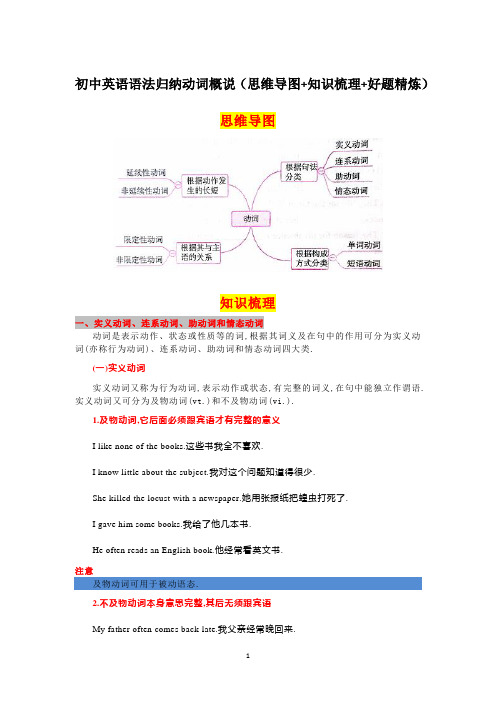
初中英语语法归纳动词概说(思维导图+知识梳理+好题精炼)思维导图知识梳理一、实义动词、连系动词、助动词和情态动词动词是表示动作、状态或性质等的词,根据其词义及在句中的作用可分为实义动词(亦称行为动词)、连系动词、助动词和情态动词四大类.(一)实义动词实义动词又称为行为动词,表示动作或状态,有完整的词义,在句中能独立作谓语.实义动词又可分为及物动词(vt.)和不及物动词(vi.).1.及物动词,它后面必须跟宾语才有完整的意义I like none of the books.这些书我全不喜欢.I know little about the subject.我对这个问题知道得很少.She killed the locust with a newspaper.她用张报纸把蝗虫打死了.I gave him some books.我给了他几本书.He often reads an English book.他经常看英文书.注意及物动词可用于被动语态.2.不及物动词本身意思完整,其后无须跟宾语My father often comes back late.我父亲经常晚回来.The sun shone brightly this morning.今天早晨阳光灿烂.不及物动词不能直接接名词,如果要接名词,要在动词和名词之间加介词或副词.I looked for my watch every place but I didn't find it.我到处找我的表,但是没找到.I'll wait for you until eight o'clock.我将等你到八点钟.有一些动词既可作及物动词,又可作不及物动词.如何区别它们,就看它们后面是否直接接名词作宾语.She sings very well.她歌唱得很好.(用作不及物动词)She sings English songs very well.她唱英语歌唱得很好.(用作及物动词)(二)连系动词它本身有一定词义,但不能单独作谓语,必须与表语一起构成系表结构.连系动词可以分为三类:1.单纯表示一个特征或状态用得最多的是be(是、在),另外还有feel(觉得、摸上去),look(看起来),sound(听起来),taste(尝起来),seem(似乎是),appear(显得、看来好像)等.The flowers look beautiful.这些花看上去很漂亮.She is a very good student.她是个非常好的学生.The cake smells strange.这蛋糕有怪味.Her voice sounds sweet.她的嗓音很甜美.I'm not feeling well. I often feel tired.我感觉不舒服.我常常感到疲劳.The medicine tastes terrible.这种药太难吃了.2.表示变成某种状态这样的动词有become(变成),come(成为),fall(变得),get(变得),grow(渐渐变得),run(变成),turn(变为),go(变成),prove(证明),make(变为).His grandma is growing very old.他的祖母年纪很大了.It's getting darker and darker.天越来越黑了.He became a doctor three years ago.他3年前当上了医生.His face turned pale. He must be ill.他的脸变得苍白,他一定是病了.He fell asleep.他睡着了.The meat has gone bad.肉变坏了.The river ran dry(=stopped flowing)during the drought.这条河在干旱期间断流了.3.表示保持某种状态这样的动词有continue(仍旧是),keep(保持),lie(处于······状态),remain(仍是),,stand(处于···状态),stay(继续处于······状态)等.Keep quiet, please.请安静.You must look after yourself and keep healthy.你要照顾好自己,保持身体健康.The weather continued fine for several days.一连好几天天气都很好.Shops remained open till late in the evening.商店开到晚上很晚的时候.The window stayed open all the night.窗子整夜开着.The house stood empty for a long time.那所房子空了好长一段时间.4.表示感觉或知觉的连系动词常用来表示人的感觉或知觉的连系动词有feel, taste, smell, sound和look,分别相当于汉语中的“摸起来,感觉”“尝起来”“闻起来”“听起来”“看上去”的概念.后面通常接形容词作表语,也可接介词短语like.The music sounds beautiful.这段音乐听起来很优美.The rock looked like a tiger.这块岩石看上去像只老虎.(三)助动词本身没有词义,不能独立作谓语,必须和主要动词一起构成谓语,表示否定、疑问、时态、语态等语法形式.常见的助动词有:be, do, have, shall, will等.She is doing her homework now.她现在正在做家庭作业.What have you been doing these days?你这些天一直在做什么?I'll be meeting them at the station.我将去车站接他们.Does anyone ever take them to school?有人送他们去上学吗?Did anyone sharpen this knife?有人把刀磨利了吗?(四)情态动词表示说话人对某一动作或状态的态度,或表示主观设想.情态动词有实际的词义,但词义不完全,不可单独作谓语,须同动词原形连用,不随人称和数而变化.情态动词所表示的情态有:命令、允诺、请求、愿望、愿意、义务、必要、可能、能力、需要等.初中阶段应掌握的情态动词有:can/could, may/might, must, shall/should, will/would, need.如:Ask Miss Gao. She may tell you why,去问高老师.她可能会告诉你原因.Need we hand in our exercise-books before class?我们需要在上课前交练习本吗?You shouldn't do that.你不该做那件事.二、单词动词和短语动词动词根据其构成方式还可分单词动词和短语动词(一)单词动词就是由一个单词构成的动词,如:live, work, study, learn, come, go, hit, strike等.(二)短语动词主动词还可由两个或两个以上的单词构成,这就是“短语动词”.短语动词大多由动词与介词/副词等搭配而成.在使用中,我们要将短语动词当作一个整体来使用.短语动词主要有以下几种类型.1.动词+介词go over复习,listen to 听,think about 考虑,look for寻找,rely on依靠,depend on 依靠,look into 调查,play with和······一起玩,send for派人去请,consist of由·····组成,arrive at 到达等.这类短语动词相当于及物动词,须跟宾语.Stop talking and listen to me carefully.停止说话,认真听我讲课.Who is waiting for you?谁在等你?2.动词+副词eat up 吃光,give up 放弃,hold up 举起,put on穿;上演,take place 发生,turn on打开,try on试穿,等它们构成新的词义,有的用作及物动词,有的用作不及物动词.Please wake me up at 5:00 tomorrow morning.请在明天早晨5点钟唤醒我.Let me try it on.让我试穿一下.Please turn on the radio=Please turn the radio on.请打开收音机.点拨(1)如果动词+副词结构的宾语是代词,就必须把宾语插在动词和副词之间.Let him in.让他进去.He turned it on.他把它打开.(2)如果宾语是名词,该名词既可放在动词和副词之间,也可放在副词之后.They put the meeting off till next week.他们把会议推迟到下周召开.He turned off the light before he left the room.他离开房间前关上了灯.3.动词+副词+介词catch up with 赶上,get on with 与某人相处,go on with 继续,keep up with 跟上,do away with 废除,look down upon 轻视,look forward to 期待,keep away from脱离,等.这类短语动词相当于及物动词,后面须跟宾语.How are they getting along with their work?他们工作进展如何?Li Ping works hard all the time to catch up with the others.李平一直努力学习,目的是想赶上其他同学.If we don't finish painting the room today, we can go on with it tomorrow.要是今天房间粉刷不完,我们明天接着干.4.动词+名词+介词catch hold of(on)抓住,握住,give lessons to给······上课,make friends with 与······交朋友,take care of照料,pay attention to 注意,等.这类动词短语相当于及物动词,后面须跟宾语.We made friends with them during the trip.我们在旅途中和他们结为朋友.Take care of yourself.保重!5.动词+形容词+介词be fond of爱好,be familiar with 熟悉,be suitable for适合,be late for迟到,be good at 善于,be afraid of害怕,等.这类短语动词相当于及物动词,后面须跟宾语.My parents are strict with me.我父母对我要求严格.My brother is good at swimming.我弟弟擅长游泳.I'm looking forward to seeing you.我高兴地期望和你见面.Are you afraid of snakes?你怕蛇吗?I'm very fond of dancing.我很喜欢跳舞.Many people are fond of showing off.有许多人喜欢炫耀.三、延续性动词和非延续性动词英语中表示动作的动词,按其动作发生过程的长短,可分为延续性动词和非延续性动词.(一)延续性动词又叫持续性动词,它所表示的动作是一种延续的动作,这种动作可以延续下去或产生持久的影响.延续性动词可以与表示一段时间的状语连用,如“for+一段时间”“since+从句(一般过去时)”“since+时间点”,how long等.这样的动词有learn, work, stand, lie, walk, keep, have, wait, smoke, watch, sing, read, sleep, live等.We have known each other since childhood.自孩提时代我们就认识.I have been living here for years.我在这里住了多年了.They've been working from morning to night.他们从早到晚一直在干活儿.点拨延续性动词通常(如一般过去时)不可以和一个表示短暂的具体时间状语连用;若用于进行时态,则可以和表示具体时刻的时间状语连用.正:The boy was reading at six yesterday afternoon.正:The boy began to read at six yesterday afternoon.误:The boy read at six yesterday afternoon.(二)非延续性动词这种动词表示的动作不能延续,即动作发生后立即结束,产生某种结果.这样的动词有close, die, arrive, post, come, fall, leave, go, break, lose, give, join, receive,buy, borrow, become, start, happen, begin, finish, kill, marry等.The boy broke his arm yesterday.这男孩昨天把胳膊弄折了.He went to Shanghai two weeks ago.两个星期前,他去上海了.It happened after three years.事情发生于三年后.如上所述,非延续性动词的肯定式不能与for, since引导的表示一段时间的短语或从句连用.点拨(1)用“(一段时间)+ago”代替“for+-段时间”或用“It is+(一段时间)+sin ce”或用“(一段时间)+has passed+ since”.(2)将非延续性动词(词组)改成be+形容词(副词、名词、介词短语等)或相近的延续性动词.四、限定性动词和非限定性动词英语动词还可以根据其与主语的关系分为限定动词和非限定动词.限定动词在句子中起谓语作用,可与助动词或情态动词连用,但必须与主语在人称和数上保持一致.(一)限定性动词The coat is much too big for me.这衣服我穿太大了.They haven't arrived at an agreement.他们尚未达成协议.He goes to school every day.他每天上学.They were preparing for the party last week.上周他们正为聚会做准备.(二)非限定性动词英语主动词有三种非限定形式,它们是不定式(包括带to的和不带to的不定式),-ing分词和-ed分词,它们在句中不起谓语作用,而可以起主语、宾语、补语、状语、定语等作用.它们不受主语的人称和数的制约.I want Bill to come with me.我想要比尔跟我一道去.I heard him lock the door.我听到他锁门了.I must get my bike repaired.我必须叫人修一下我的自行车.Doing this can save a lot of time and money.这样做可以节省很多时间和钱.I can't help laughing.我忍不住笑了.好题精练一、选择填空1.No one knew why Miss Black_________ the new boxes.A. has brokenB. had brokenC. would have brokenD. have broken2.-Where are you_________?-At the Grand Hotel.A. stayingB. livingC. remainingD. stopping3.Don't keep on_________ the book.A. findingB. seeingC. borrowingD. reading4.What a fine day, _________.A. what are theyB. won't itC. isn't itD. No, it isn't5.The stranger told us his name after we_________ him twice.A. askedB. have askedC. were askingD. had asked6.Today is Saturday. Tomorrow_________ Sunday.A. is going toB. willC. will beD. is going to be7.Don't worry, the train_________ yet.A. arrivedB. won't arriveC. has arrivedD. hasn't arrived8.Tim_________ the army for three years.A. has joinedB. has taken part inC. has attentedD. has been in9.I believe she'll always keep what you_________ her.A. have just givenB. just gaveC. won't giveD. had given10.One morning while I_________ along the street, I_________ an old man crying.A. walking; heardB. walked; heardC. was walking; was hearingD. was walking; heard答案:1-5BADCD 6-10CDDAD二、改正下列句中的错误1.The old man is dieing._________________________________________________________________________ ___2.They entered into the hall one after another._________________________________________________________________________ ___3.Before liberation the Yellow River often overflew its banks._________________________________________________________________________ ___4.She married with a rich man at the age of twenty._________________________________________________________________________ ___5.The cake tasted well._________________________________________________________________________ ___6.What did they discuss about at the meeting?_________________________________________________________________________ ___7.The sun raises in the east._________________________________________________________________________ ___8.We ought study hard for the people._________________________________________________________________________ ___9.I have put up the map on the wall an hour ago._________________________________________________________________________ ___10.Do you agree me on this point?_________________________________________________________________________ ___答案:1.dieing→dying2.去掉into3.overflew→overflowed4.去掉with5.well→good6.去掉about7.raises→rises8.ought→ought to9.have put up→ put up10.agree后加with。
英语语法之动词思维导图

看情态动词专题动词verb动词分类根据句法功能根据动作状态实义动词及物动词不及物动词连系动词be 动词助动词特点:不能单独做谓语,只能和主要动词一起构成谓语,主要用来表示否定,疑问,时态,语态,语气等。
be(am, is are),was, were情态动词+单宾语I eat an egg every day.+双宾语+宾语+宾补不带宾语不及物动词+介词+宾语+间接宾语(sb.)+直接宾语(sth.)+直接宾语(sth.)+to/for+间接宾语(sth.)I agree.I agree with him.The news made him excited.感官系动词变化系统词持续系动词状态动词动作动词延续性动词非延续性动词be 在不同的时态和人称后有不同变化。
五感动词:look,feel,taste,smell,soundHe is/was in Yichang.We are/were students.She looks happy.This flower smells very sweet.This kind of cloth feels very soft.变化:become,grow,turn,get,fall等It becomes cold.The leaves turn yellow.The boy falls asleep.持续:keep,remain,stay等He always keeps silent at meeting.This matter remains a mystery.do(does),didwill(would),shallhave(has),hadHe gives me a book.He gives a book to me.She came.表时态:The cat is eating a fish.The cat was eating a fish at that time.表语态:The fish is eaten by the cat.表时态:The cat ate a fish.表否定:I don't like the cat.表疑问:Do you like the cat?表时态:I will buy a cat.He said he wouldn't buy a cat.表疑问:Will you buy a cat?表时态:He has bought a cat.He told me he had bought a cat.表疑问:Have you bought a cat?can(could) ; may(might) ; must ; should/ought to ; need ; dare ;had better ; used to; will/would主要描述转态,表示相对静止的动词,通常不能用于进行时态。
初中英语语法思维导图总结 - 词法之词的功能和词形变化

词法:词的功能:句子成分八大句子成分:主语,谓语,宾语,定语,状语,补语,表语,同位语1、主语:通常由名词、代词、数词、名词化的形容词、不定式to do、动名词doing或从句担任。
Eg. She went out in a hurry.她匆匆忙忙地出去了。
(代词)Workers build factories and houses.工人建造工厂和房屋(名词)Three plus five is eight. 3加5得8.(数词)To see is to believe.眼见为实。
(不定式)Smoking is bad for health.吸烟有害健康。
(动名词)When we shall leave hasn’t been decided。
(从句)The young should respect the old.年轻人应该尊重老年人。
(名词化形容词)2、谓语:谓语由动词构成,由简单谓语和复合谓语之分。
①简单谓语:由动词或动词词组组成Eg. The sun rises in the east.太阳从东方升起。
He looked after two orphans.他照顾两个孤儿。
②复合谓语:由“情态动词或助动词+动词”构成;“连系动词+表语”构成复合谓语Eg.He can speak English very well.他英语说得很好。
The work must be done before three o’clock.这项工作在三点前必须做完。
This film is interesting.这部电影很有意思。
He seems unhappy.他似乎不高兴。
3、宾语:表示及物动词或及物动词短语的对象或内容,或用于介词后构成介词短语;通常由名词、代词、数词、动词不定式、动名词或从句等担任。
宾语包括动词宾语(直接、间接)和介词宾语。
Eg. They offered me the job. 他们把那份工作给了我。
